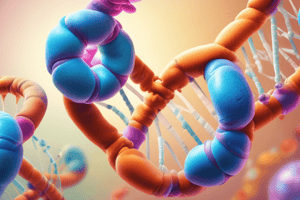Podcast
Questions and Answers
What plays critical roles in controlling when and where specific genes are active?
What plays critical roles in controlling when and where specific genes are active?
- Promoters, enhancers, silencers, and insulators (correct)
- Transcription factors, ribosomes, tRNAs, and spliceosomes
- Lipids, carbohydrates, proteins, and nucleic acids
- Cytoskeleton, mitochondria, Golgi apparatus, and endoplasmic reticulum
What type of mutations can lead to genetic disorders and diseases?
What type of mutations can lead to genetic disorders and diseases?
- Conjugation, transduction, transformation
- Point mutations, insertions, deletions, amplifications (correct)
- Phenotypic mutations, genotypic mutations, allelic mutations
- Prokaryotic mutations, eukaryotic mutations, viral mutations
What is essential for modern medicine to diagnose genetic disorders and develop personalized treatments?
What is essential for modern medicine to diagnose genetic disorders and develop personalized treatments?
- Understanding molecular genetics (correct)
- Exploring quantum physics
- Studying evolutionary biology
- Analyzing geological formations
Which technique has revolutionized biomedical research by enabling rapid gene identification?
Which technique has revolutionized biomedical research by enabling rapid gene identification?
How has molecular genetics transformed our understanding of genetics?
How has molecular genetics transformed our understanding of genetics?
What type of elements control when and where specific genes are active?
What type of elements control when and where specific genes are active?
What is the focus of molecular genetics?
What is the focus of molecular genetics?
Which nitrogenous base always pairs with adenine in DNA?
Which nitrogenous base always pairs with adenine in DNA?
What process involves copying the DNA sequence into messenger RNA (mRNA)?
What process involves copying the DNA sequence into messenger RNA (mRNA)?
What molecule is used to build proteins during translation?
What molecule is used to build proteins during translation?
Why is the stability of base pairs crucial for inheritance?
Why is the stability of base pairs crucial for inheritance?
Which of the following is NOT a nitrogenous base present in DNA?
Which of the following is NOT a nitrogenous base present in DNA?
Flashcards are hidden until you start studying
Study Notes
Understanding Molecular Genetics
Molecular genetics is a fundamental area of biology that focuses on the structure and function of genes at the molecular level. It involves the investigation of the chemical nature of the gene, how they are arranged on the DNA molecule, how DNA is replicated, transcribed, and translated into proteins, as well as other general techniques such as gene amplification and detection.
Molecular Basis for Inheritance
In molecular genetics, the structure of DNA is crucial to understanding inheritance. Deoxyribonucleic acid (DNA) consists of nucleotides with four nitrogenous bases: adenine (A), guanine (G), cytosine (C), and thymine (T). These bases form complementary hydrogen bonds during the formation of the double helix, with A always pairing with T and G always pairing with C. The genetic information stored in DNA can be passed down through generations due to the stability of these base pairs and the ability of DNA strands to separate and serve as templates for new strands during cell division.
Gene Expression and Regulation
Molecular biology also encompasses the processes of transcription, where the DNA sequence is copied into messenger RNA (mRNA), and translation, where the mRNA sequence is used to build proteins. Both processes occur within cells and involve complex interactions among molecules and structures, including ribosomes, transfer RNAs (tRNAs), and amino acids. Additionally, genes need to be regulated to ensure proper expression at the right time and place; regulatory elements such as promoters, enhancers, silencers, and insulators play critical roles in controlling when and where specific genes are active.
Mutations and Genetic Changes
Genetic changes can occur due to natural processes or spontaneous mutations that alter the DNA sequence. These mutations can lead to genetic disorders and diseases, affecting an individual's health and wellbeing. There are various types of mutations, including point mutations, insertions, deletions, amplifications, inversions, and translocations. Each type has different implications for protein function and fitness of the carrier.
Applications in Medicine and Research
Understanding molecular genetics is essential for modern medicine because it allows doctors and researchers to diagnose and understand the causes of genetic disorders, develop personalized treatments based on genetic profiles, and predict how individuals may respond to certain medications due to variations in gene expression. Additionally, molecular techniques such as polymerase chain reaction (PCR), DNA sequencing, and bioinformatics have revolutionized biomedical research by enabling scientists to rapidly identify genes involved in specific diseases and study their functions at unprecedented detail.
In conclusion, molecular genetics is a dynamic field that combines chemistry, biology, and mathematics to uncover the fundamental principles of inheritance and disease at the molecular level. It has transformed our understanding of genetics and its practical applications in medicine and biotechnology.
Studying That Suits You
Use AI to generate personalized quizzes and flashcards to suit your learning preferences.




